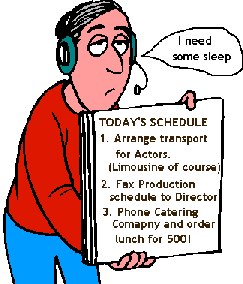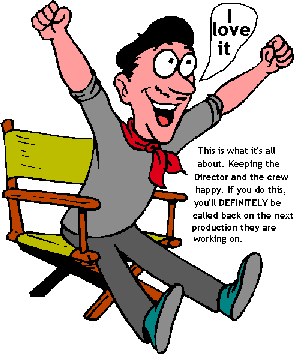


As was mentioned earlier, a PA wears many hats. The tasks involved on a job will depend on many things: the size of the production budget, the amount of crew members, the duration of the project, etc. Taking all this into consideration, you can see why it's difficult to determine exactly what your responsibilities will be for every job. But there are common tasks that are expected from almost all PA's. Those will be discussed here.
First, you should know how to drive a car, or small pickup truck. (You'll be surprised how much these skills come in handy; in fact, they could be the deciding factor in a Production company's decision to hire you).It's almost certain that you'll run errands for the crew members and especially the Producer. You may be asked to purchase office supplies or deliver a script and/or a contract to an actor. There's always something somebody will need. If the production provides a vehicle, then you'll probably won't need your own. Find out ahead of time if you'll need a car if you don't have one. If you use your own vehicle, you should be reimbursed for all your petrol expenditures. This is something you should find out about when you're interviewed for the job. They'll appreciate you asking and will see that you're on the ball.
One more point on the subject of vehicles:- do make sure you have the right insurance for the vehicle you are driving. If it is provided by the Production company, then they will take care of this for you. If you are using your own vehicle, find out if you are insured to use the car for film work, if you can you carry members of the crew as passengers etc,etc. You'll be surprised how Insurance companies refuse to pay if God forbid, you have an accident in your car during work on a film and you're not adequately covered. It can cost quite a bit to get the right cover, but it can save you a lot of aggravation in the long run. On a bigger budget production, the Production company may well pay this expense for you, for your own car.
You may be asked to keep track of all the production files. This includes things such as budgets, scripts, receipts, contracts, location maps, actors' CV's/Resumes, cast and crew phone numbers, etc. You must be organized! That's an important skill of any good PA. You have to be organized as you'll find that the rest of the crew depends on it. When the Producer asks you for the latest budget analysis, you should have it ready for him in a flash. Keeping good, organized files will make your job easier and will be appreciated by all. And keeping track of all the details (including files and papers) is, in most cases, the PA's responsibility. Again, it will depend on the job.

It's important to note here that you should keep all your receipts. The Producer will most likely give you cash at times to purchase something that is needed on the set. Always ask the cashier for a receipt and put it in your receipt files for safekeeping and future reference.
PA's are normally responsible for making ground maps for cast and crew. If you're not a good draughtsman or artist, then by all means, use a ruler, and try and get the basics right. Don't try and be Picasso, and end up with a right mess, and more importantly, no map ready on time! The map should be legible and easy to read. These are maps that help the cast and crew find a particular location. Make sure to include any obvious landmarks in your map, such as a church, school, shopping centre etc. This will help the crew find the location easily. You may have a copy of the local A-Z, or a printed map. If so, photocopy it and highlight the route with a marker pen. This will make it easier for you, and for the crew when they are looking at it. Also, make enough copies of the map for everyone including the Producer. Your map should fit on one page as most people will be looking at it while driving at the same time. Whatever you do, don't "guess" the directions. If you make a mistake on your map you won't work another day on that job. After drawing your map, give it to someone to see if they understand it. If they don't, do it again, until they do.
Most PA's are responsible for keeping a cast and crew contact sheet. This is vital to all productions. THIS SHEET LISTS THE NAMES, ADDRESSES AND ALL PHONE NUMBERS OF EVERY PERSON WORKING ON THE PRODUCTION, INCLUDING ACTORS. You should even have a place for emergency contact phone numbers. There's nothing worse than not being able to contact someone to change a call time or make a location change. If you can't find someone at a moments notice, the Producer is going to be very upset. If you can, get everyone's mobile/pager numbers - anything that will help you find the person fast. Make copies of the contact sheet for all crew members and all the cast. Keep extra copies in several handy places so you always have access to them.
The PA may be responsible for the production schedule. Usually, this is the job of the Production Manager or coordinator. If the project is low budget, there's a good chance there won't be a manager or coordinator. Therefore it will be up to the PA to construct a legible schedule that will list the pre-production schedule, production schedule, and post-production schedule. The pre-production schedule includes meetings, casting sessions, budget planning and anything to do with the execution of the actual production. The production schedule lists the shoot days. This includes a detailed description of what scenes or script pages will be shot on what days and at what times. It lists where the shoots will take place - at a studio or on location. It's also a very good idea to include in the production schedule, the names of the people involved in the shoot - include cast and crew.
Lastly, the post-production schedule includes editing sessions, voice-over sessions, dubbing sessions and anything to do with the construction of the final product whether it be video, film, or CD-ROM. The Producer may have a format that he or she wants you want you to follow when constructing the schedule sheets. If not, create your own. Make sure it's easy to understand. If you're unclear on how to create a pre-production, production and post production schedule, there are many good books that have samples in them, and there are now several software programs available that will create schedules for you quite easily. A Production schedule is not that different from a calender. The most important thing to remember is to keep it well organized and easy to read. Make it neat - use grids. You can put the dates and times at the top and put the scenes or script pages to be shot on the left of the page. Then you can fill in the names of the cast and crew in the corresponding boxes. Be sure to put the call times (the time to begin working, in case you didn't know) on the schedule too. As was mentioned earlier, if there's a Production Manager or coordinator on the job, then you won't be making the schedules.

PA's usually need to make a lot of phone calls. You may be calling crew members, actors, actors' agents, Prop companies, studios, caterers, location managers, etc. The important thing to remember is to be professional and friendly. Always introduce yourself first and tell them (right away) why you are calling. For example, if you're calling an agent to see if a certain person is available for an audition, you would say something like, "Hi this is John Smith with Jet productions in London and we would like to know if Lisa Taylor is available for an audition at 2 PM on Friday, October 11th." The more details you give, the better. Giving the listener dates and times right away will make you sound truly professional. Remember, you're a representative of the production company you're working for. Therefore, how you come across on the phone will be a direct reflection on the production company. If you sound professional, there's no doubt this will get back to the Producer as a compliment to his company. It won't be long before you'll be promoted to a higher position.
As you can see, the tasks that a PA must perform are varied. What you do on one job may be totally different from what you do on another. Being flexible is an important asset of a good PA. Also, the willingness to take on new tasks is a necessary quality. You must learn to say "I can" when working as a PA. You have to be able to solve problems in a timely manner. Having good resources can help you do that. For example, having a production "bible", phone book, list of industry contacts, etc, available to you at all times can prove invaluable. In the UK, there is a book, called THE KNOWLEDGE. It lists all types of companies associated with film production. Also, a London Yellow Pages is a useful aid, as it lists literally hundreds of Production Companies in the Greater London area. Or, if you live in London, then go to Soho, Wardour Street, to be precise. It is the heart of the film industry. Nearly every building there is a Production company. In Los Angeles, there is a book called LA 411 which lists every company involved in the production process in the Greater Los Angeles area. As a PA working in Los Angeles, it's a "must have." To obtain a copy, call (001) 213-460-6304. In Chicago, you can purchase either THE CHICAGO CREATIVE DIRECTORY [(001) 312-236-7337], Screen Magazine's CHICAGO PRODUCTION BIBLE [(001) 312-664-5236].
Most large cities (in the US) have a production resource book. You can find one in your city by calling either the Film Commission in your state and asking them, or by checking in the Yellow Pages for production publications. If you're really stuck and can't find one, call a local production company and ask them if they know of a Production publication listing Production companies and services. When you show up to an interview as a Production Assistant and you have a Production resource book in your hand for that city, you'll certainly come across as a professional, ready for work.
You can also contact the Mayor's office in most major cities. They publish a weekly list of what productions are being filmed in that city, who's hiring, positions available etc. This is a very useful resource. they list entry level positions, as well as more advanced positions. You will always find PA positions listed in there. Also, use your eyes and ears. While you're going about your business, you're bound to come across a film crew filming something or another. It's always worth approaching them. Obviously they will be busy, but try and catch them when they are having a break. Tell them who you are, and ask for the person responsible for hiring production staff. Get the relevant details, i.e. name/address/phone numbers etc. then get out of there! You don't want to get on their nerves. You may be lucky and the person you are talking to is the Producer, and he seems keen to hire you. But this is rare. When a crew is filming on location, they are always fighting the clock. So be careful how you approach them. We will now move on to the next section, called DO'S & DON'TS